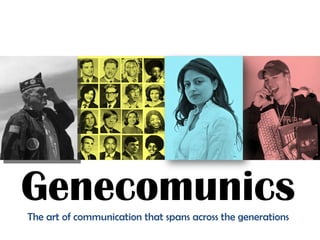
Genecomunics
- 1. Gene c omunics The art of communication that spans across the generations
- 4. Traditionalist (Born : 1922- 1943) Baby Boomers (Born : 1943 -1960) Generation X (Born : 1960- 1980) Generation Y (Born : 1980- 2000 )
- 5. Baby Boomers
- 7. 10,000 daily
- 8. 96 % of Gen Y
- 9. 50 M 100 M 1B 38 years 10 years 4 years 3 years 9 months
- 12. Hard work Dedication Sacrifice Respect for rules Duty before pleasure Honour
- 14. Optimism Team orientation Personal Gratification Involvement Personal growth
- 16. Diversity Fun Informality Self –reliance Pragmatism
- 18. Optimistic Feel Civic Duty Confident Achievement oriented Respect for diversity Techno literacy
- 19. Focus on common ground If it is to be its up to ME
- 20. LEFT Writing Language Scientific skills Mathematics Lists Logic THINKING MODE RIGHT Emotional expression Music Creativity Imagination Dimension Whole picture HOLISTIC MODE
- 21. Black Blue Green White Green Red Green Aqua Yellow Yellow Pink Tan Red Yellow White
- 22. I DOMINENT INSPIRING SUPPORTIVE CAUTIOUS OUT GOING RESEVRED TASK ORIENTED PEOPLE ORIENTED Results Recognition Reason Relationship
- 23. Core Values Family Education Communication media Dealing with money Respect for authority Confirmers Discipline Traditional Nuclear A dream Rotary phone One on one Memo Put it away Pay in cash Optimism Involvement Disintegrating A birthright Touch tone phones Call me anytime Buy now pay later Skepticism Fun / informality Latch key kids A way to get there Cell phones Call only at work Cautious Conservative Save, save , SAVE Realism Confidence Extreme fun Social Merged families An incredible expense Internet picture phones email Earn to spend Traditionalist (Born : 1922- 1943) Baby Boomers (Born : 1943 -1960) Generation X (Born : 1960- 1980) Generation Y (Born : 1980- 2000 )
- 24. What side of the brain dominancy did the two characters have ? What were their behavioural styles ? What barriers did they have in their communication styles ? What could they have done to help bridge the communication gap ? What generation did they belong to? What were their generation values ?
- 25. Speak and judge the person seated next to you Question Answer Is he /she a right or left brainer ? Why is his or her behavioural style ? What is his/ her generation type ? What does he /she value?
- 28. Don’t talk @ …. Talk to the person
Notes de l'éditeur
- The other mode of collecting information is by identifying the values of the different generations . Lets recap what they look for as key values in common areas of family , education , communication media and handling money.
- Ask audience what the two characters behavioural styles are? Mr. G is a Cautious person and the subordinate is a dominant person What were the existing barriers in their communication ? Subordinate spoke to fast , Mr. G didn’t understand the new trends , Subordinate didn’t give time for Mr. G to clarify any concerns , What could have been done to develop a better communication channel between the two characters ? Subordinate - spoken slower used words and phrases that are understandable Mr. G - Clarified any concerns What side of the brain dominancy did the two characters have ? Mr. G - Left brain ,why ? Asked to put down ideas into a presentation , chart Subordinate - Right brain , why ? Creative ideas , looked at things on a holistic approach What generation did the two characters belong to and what values did they have ? Mr. G - Baby Boomer – optimism and involvement but slow to pick up on technology Subordinate - Generation X - realism , confident , social
